Heading out the door? Read this article on the new Outside+ app available now on iOS devices for members! Download the app.
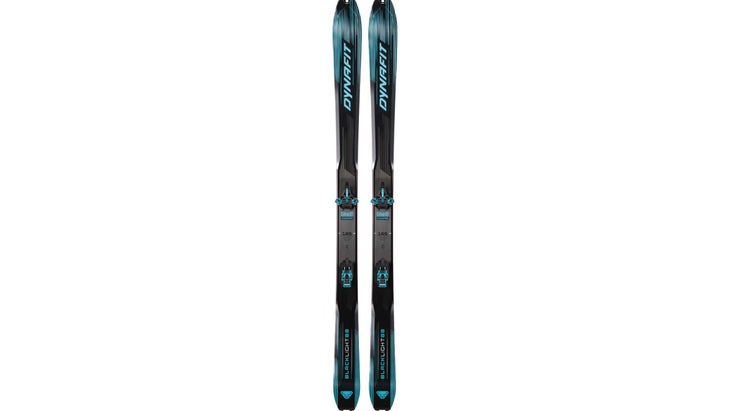
Lightest: Dynafit Blacklight 95
- Price: $750
- Weight: 6 lb. 6 oz.
- Best for: Going fast uphill
- Buy Now
If you like to set your alarm for an ungodly hour and count every gram, the Blacklight 95 is the ski for you. It’s the newest and widest addition to the built-for-speed Blacklight series, and it’s also the most versatile. The rockered tip allows for float in the fluff, and a turned-up tail releases in sticky snow, allowing for quick speed dumps. One tester touring up Vermont’s Smugglers’ Notch found the Blacklight to be light, fast, and aggressive on both the uphill and the down. This ski prefers short-radius turns, and eagerly jumps through tight trees, but the full-carbon construction was sometimes twitchy when our tester wasn’t driving it hard. The edges bit on east coast ice, and the stiff tail popped instantly in and out of turns.
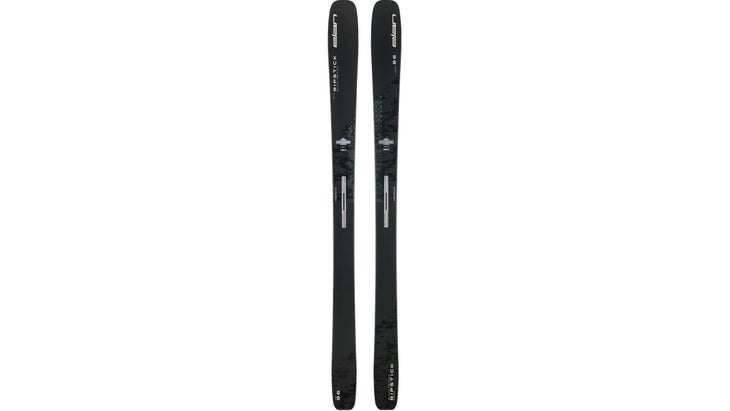
Best All-Mountain Crossover: Elan Ripstick 96 Black Edition
- Price: $800
- Weight: 7 lb. 8 oz.
- Best for: Going fast downhill
- Buy Now
This ski, which is beefy enough to stand up to powerful turns in the backcountry, was our New Hampshire-based ex-racer’s dream. The Ripstick 96 Black Edition is not strictly a backcountry ski, but it’s so stable on the descent that you’ll happily haul it everywhere. With a do-it-all waist width, it cheerfully adapts to any habitat—be it in on the resort or miles out of bounds. The Black Edition’s secret sauce is carbon, both in rods running through the lightweight wood core and fiber reinforcement along the inside edges (the ski is asymmetrical). The result is an uphill-capable downhill ski that’s so fun and playful—while remaining superdependable at speed—it brings actual meaning to the term “freeride.”
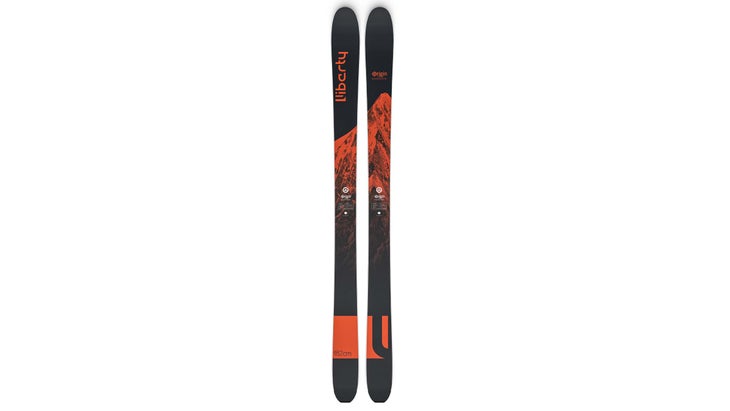
Most Versatile: Liberty Origin 106 BC
- Price: $800
- Weight: 7 lb. 3 oz.
- Best for: Skiing year-round in any conditions
- Buy Now
The Origin 106 BC nails the ideal waist width for soft-snow adventuring, with some extra versatility to spare. On Colorado’s Uneva Peak it proved wide enough to fl oat in the deep, yet light enough that the uptrack wasn’t a slog. This ski has a similar profile (rocker-camber-rocker) to the resort-oriented Origin 106, which eases turn initiation, bites on hardpack, and surfs through the fluff, but without metal laminates to weigh it down. Our Colorado tester found it nimble and snappy, thanks to the responsive aspen and carbon-fiber core. “It’s lively and bursting with energy, especially in short turns through tight trees,” she says. She noted that it purred through open powder fields and performed remarkably well on the crud in the runout.
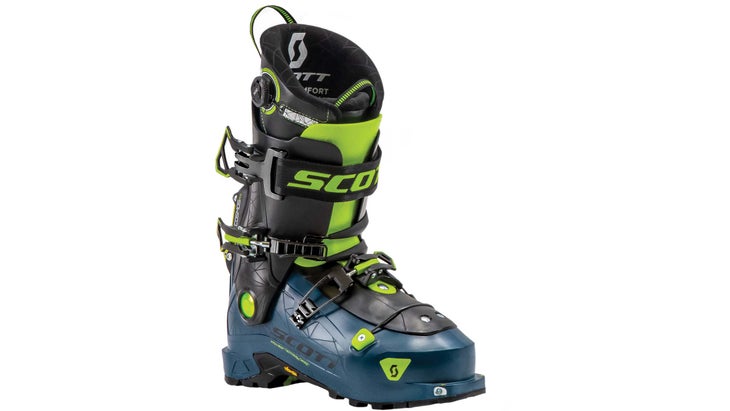
Best Daily Driver: Scott Cosmos Pro/Celeste Tour
- Price: $800
- Weight: 6 lb. 3 oz.
- Best for: Sidecountry, backcountry, and everything in between
- Buy Now
Our Colorado-based tester lives by one credo: You go up to go down. That’s why he was happily surprised by the new Cosmos Pro—it was light enough to inspire multiple laps on Vail Pass, yet strong enough to really mash his shins into. The Pro is the stiffest in the all-new Cosmos line, and it sports a hybrid shell designed to optimize the progressive flex of a cabrio (a three-piece boot with a structural tongue and more dynamic flex) and the precision and power of a traditional four-buckle boot, all while delivering a 60-degree range of motion. The Boa-laced liner, though, was our tester’s favorite part: “Not only is it comfortable, but there aren’t any gaps in the fit. I loved how it hugged my foot, ankle, and leg,” he says. He appreciated the ease of the walk-mode switch, which flips quickly even with gloves on, and the aggressively lugged Vibram sole for scrambling in the alpine. Fit note: A wide last is roomy in the forefoot, but it can feel short in the toes. The women’s version is the Celeste Tour, which has a 110 flex.
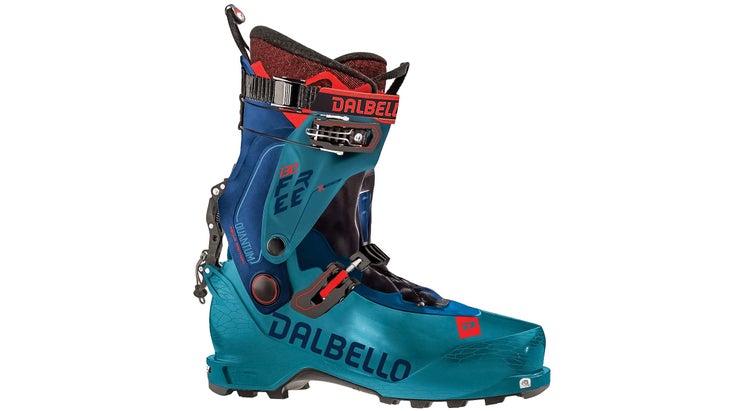
Best for Making Miles: Dalbello Quantum Free Asolo Factory 130
- Price: $800
- Weight: 6 lb. 3 oz.
- Best for: Long tours
- Buy Now
This lightweight boot is built for fast, technical ascents and racking up serious vert. Our testers found it to have excellent articulation in the ankles and a 65-degree of range of movement—especially useful for one tester when he was sidehilling across early morning frozen corn in Colorado’s San Juans. Designers shaved weight by incorporating carbon in the shell and omitting plastic in the shin (which one tester complained gets packed with snow). When it came to harvesting that sun-ripened Colorado corn on the descents, the Quantum Free was torsionally stiff enough to make for quick turns and, while the fore-aft flex felt far softer than 130, it was still impressive considering its feather-lightness. “Great at going uphill,” one tester says. “Fast and light! Fit my narrow foot, too.” The new women’s version is the Quantum Free 105 W, which has a 105 flex.
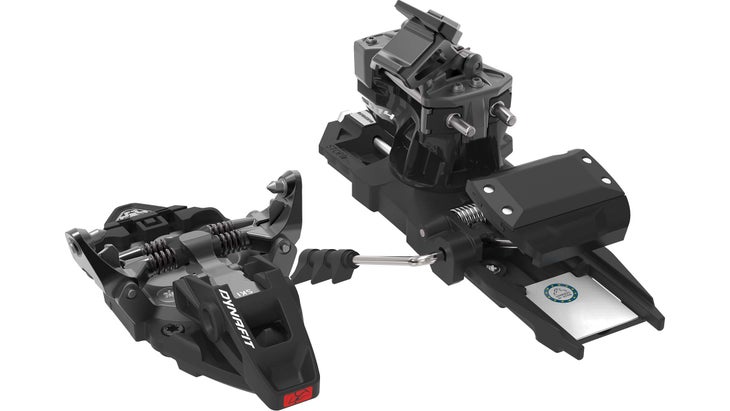
Beefiest: Dynafit Rotation 14
- Price: $650
- Weight: 1 lb. 5 oz.
- Best for: Big lines
- Buy Now
The Rotation 14—the newer, meatier brother to the classic Rotation 10 and 12—brings tourability and skiability in an AT binding closer than ever. While the 14 DIN may seem a bit much, that’s not what makes it so bomber: A new toe piece with stiffer springs makes this the hardest-charging binding Dynafit makes, and it weighs only 605 grams. One of our east coast testers noticed the difference while navigating push piles of slush at closed-for-the-season Bolton Valley, noting it would be perfect for the springtime couloir-hunting she used to do in Colorado. “It’s so beefy, I could ski aggressively in a variety of conditions—mank, crud, and spring corn—with the ability to tip a turny ski on edge instantly,” she said. The Rotation 14 is the first traditional tech binding (as opposed to a Marker Kingpin, which has an alpine-style heel) with a full TUV safety certification, too, which means it has safety ratings similar to an alpine binding.